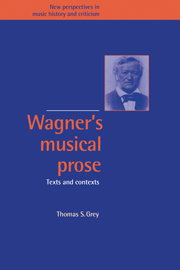Book contents
- Frontmatter
- Contents
- Preface
- 1 Wagner and the problematics of “absolute music” in the nineteenth century
- 2 Beethoven reception and the hermeneutic impulse: “poetic ideas” and new forms
- 3 Engendering music drama: Opera and Drama and its metaphors
- 4 The “poetic-musical period” and the “evolution” of Wagnerian form
- 5 Endless melodies
- 6 Motives and motivations: leitmotif and “symphonic” drama
- Appendix 1 The “poetic-musical period” (from Opera and Drama, Part III, section 3)
- Appendix 2 Principal writings of Richard Wagner cited in the text
- Bibliography
- Index
Appendix 1 - The “poetic-musical period” (from Opera and Drama, Part III, section 3)
Published online by Cambridge University Press: 22 September 2009
- Frontmatter
- Contents
- Preface
- 1 Wagner and the problematics of “absolute music” in the nineteenth century
- 2 Beethoven reception and the hermeneutic impulse: “poetic ideas” and new forms
- 3 Engendering music drama: Opera and Drama and its metaphors
- 4 The “poetic-musical period” and the “evolution” of Wagnerian form
- 5 Endless melodies
- 6 Motives and motivations: leitmotif and “symphonic” drama
- Appendix 1 The “poetic-musical period” (from Opera and Drama, Part III, section 3)
- Appendix 2 Principal writings of Richard Wagner cited in the text
- Bibliography
- Index
Summary
The “poetic-musical period” (from Opera and Drama, Part III, section 3)
[152] Alliterative verse [Stabreim], as we have seen, already connects speech roots of varied or contrasted expression (such as Lust and Leid, Wohl and Weh) so as to make the connection audible to our sense of hearing, and in this way also presents these roots to the feeling as generically related. Imagine, then, to what greater degree of expression these connections can be made sensually perceptible to our feeling with the help of musical modulation. Let us take for example a line of Stabreim containing a perfectly unified range of expression: Liebe gibt Lust zum Leben [love gives pleasure to life]. Since the alliteration of accented syllables in this line is matched by a perfect congruity of emotional content, the musician would have no occasion to depart from his initially chosen tonality in setting these words; a fully adequate musical setting would need to take account only of the strong and weak syllables, while remaining within a single key, appropriate to the emotional unity of the text. If, on the other hand, we take a line of mixed emotional significance, such as die Liebe bringt Lust und Leid [love brings pleasure and sorrow], the musician would need to match the contrasting emotions of the alliterated words by modulating from his original tonality into a contrasting, related one appropriate to the contrasting sense of the final word.
- Type
- Chapter
- Information
- Wagner's Musical ProseTexts and Contexts, pp. 375 - 377Publisher: Cambridge University PressPrint publication year: 1995

